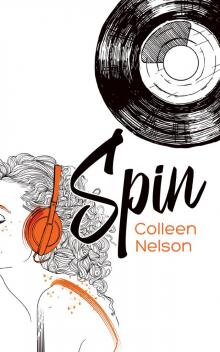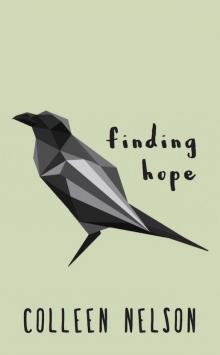- Home
- Colleen Nelson
Pulse Point
Pulse Point Read online
Copyright © 2018 Colleen Nelson & Nancy Chappell-Pollack
Yellow Dog
(an imprint of Great Plains Publications)
1173 Wolseley Avenue
Winnipeg, MB R3G 1H1
www.greatplains.mb.ca
All rights reserved. No part of this publication may be reproduced or transmitted in any form or in any means, or stored in a database and retrieval system, without the prior written permission of Great Plains Publications, or, in the case of photocopying or other reprographic copying, a license from Access Copyright (Canadian Copyright Licensing Agency), 1 Yonge Street, Suite 1900, Toronto, Ontario, Canada, M5E 1E5.
Great Plains Publications gratefully acknowledges the financial support provided for its publishing program by the Government of Canada through the Canada Book Fund; the Canada Council for the Arts; the Province of Manitoba through the Book Publishing Tax Credit and the Book Publisher Marketing Assistance Program; and the Manitoba Arts Council.
Design & Typography by Relish New Brand Experience
Printed in Canada by Friesens
Library and Archives Canada Cataloguing in Publication
Nelson, Colleen, author
Pulse point / Colleen Nelson & Nancy Chappell-Pollack.
Issued in print and electronic formats.
ISBN 978-1-927855-97-3 (softcover).--ISBN 978-1-927855-98-0 (EPUB).--
ISBN 978-1-927855-99-7 (Kindle)
I. Chappell-Pollack, Nancy, author II. Title.
PS8627.E555P85 2018jC813'.6C2017-907263-3
C2017-907264-1
For Mitchell, Shane, Talia and Casey Pollack
Kaia
I was lean, we all were. Mae told me about the plumpness of bodies before. It sounded so funny, to think of bodies jiggling, a layer of fat coating muscles. The only thing I could pinch between my fingers was skin. This was how bodies were meant to be in the City: efficient machines. The gymnasium was busy, as it always was in the morning. Citizens were eager to earn joules to take them through the day. I took my spot on a running mat beside a woman who walked with plodding, determined steps. Her sunken cheeks puffed out with effort. Droplets of sweat fell to her tight-fitting running suit and were immediately absorbed.
As I ran, I watched the digital display on my finger climb past 70 to 80 and then over 90. If I rubbed my thumb against my forefinger, I could feel the small, raised bump, a microchip that had been implanted at birth. Every Citizen had a pulse point; it connected us and monitored the energy we used and the energy we created. ‘Energy in equals energy out’ was the chant we lived by. Equilibrium was essential to maintain the safety and security of the City.
I could feel someone watching me and looked up to the balcony. Wearing his uniform, a grey tunic still stiff with newness, stood an overseer with a hint of a grin on his face. I resisted the urge to smile back. Lev should know better. The overseers had important jobs in the City. They were the Council’s right hands, ensuring order was maintained. The Lev I knew was anything but an enforcer. He’d sworn to me that he wouldn’t take his role as seriously as some of the others did. I wanted to believe him, but up there with his hands clasped behind his back, shoulders and spine set, he looked like the rest of them. Except for the slight curve of his mouth when his eyes fell on me.
There was one other thing that marked him as different. A large stain, as big as a handprint, stretched across his left cheek. He kept that side of his face turned away from the gymnasium. A superficial defect, it had gone unnoticed on the genetic screenings before he was born. He wasn’t a defective, but he was less than perfect to some Citizens, who shied away from him. It had never bothered me; maybe because I had blue eyes, another rarity in the City. We’d been friends for as long as I could remember.
From up above, he winked at me and my stomach fluttered. I gave a slight shake of my head, a warning for him to get back to work. I loved the attention, but if another overseer caught him, he’d get reprimanded, no matter who his birth elder was.
The woman beside me slowed her pace as I sped up. She checked the numbers glowing through the skin on her index finger. Satisfied, she stepped off her mat. I wondered how long she’d been on it. I’d reach my minimum joules in under an hour, but I’d keep going. I’d share the extra energy I accumulated with Mae. As I ran, my core muscles tightened, the momentum of my legs effortless, my breath coming in short, economical bursts. I looked over. Beside me someone else had taken the place of the woman.
“When did you get here?” Sari asked, grinning. Her blond hair, long enough to be harvested and used for fertilizer or woven into fabric, was tied up. I’d miss her hair. Mine had been recently cut. Unlike Sari’s, it was short and fine, curling a little at the temples, I didn’t miss the weight of the long hair. But Sari’s hair was something else. It usually hung in a golden sheet down her back.
“A few minutes ago.”
“Long enough to see Lev?” she teased.
I lifted my eyes to the balcony. A different overseer watched us, older and stern-looking. Behind him, through the transparent, solar-panelled dome, the sky glowed fiery orange and clouds pooled in the distance, brewing a storm.
“Still hoping you’ll be matched with him?”
I never should have shared my secret with her, I thought with a twinge of regret. “No, because it’ll never happen.” A defensive tone crept into my voice, which only annoyed me more. As the offspring of a female who’d died young, my genetic ranking would be too low to match with an overseer. Even though Lev was marked, he was progeny of Kellan, the legendary overseer, and Tar, a Councillor, making him a top pick for a mate.
“Never know,” she sang out.
It was second nature to glance at someone’s fingertip. As much information could be learned from it as the expression on their face. Sari’s energy level was already high. Why was she at the gymnasium? She caught my look and gave me a guilty one in return. “I can keep my hair a while longer if I energy share,” she said, averting her eyes.
I shook my head at the thought of the corrupt overseer who was willing to take energy in exchange for bending the rules. Her hair was long past harvesting length. If someone on the Council noticed, they’d ask questions. It was dangerous for both of them. But vanity was Sari’s downfall; the admiring glances of others was too tempting to ignore. More than once, I’d seen her pink her lips and cheeks with berry juice. Even now, as her hair fell out of its tie, she let it wave behind her as she ran.
“Once I’ve been matched, I’ll cut it off,” she promised. Her words came out in quick bursts as she ran.
“How much are you giving him?” Deals for energy didn’t usually favour the seller.
“Her,” she corrected. “Thirty joules.”
“A day!” I stumbled on my mat and looked up, the overseer had moved on. “That’s crazy!” I hissed.
Sari’s cheeks had grown rosy with exertion, or shame. “My profile went up twenty-three days ago. The only options I’ve been given were a wastewater engineer, a storeroom supervisor and gardener apprentice.” She shot me a look, and I knew in Sari’s mind, those would never do. “Someone suitable has to show up soon, right?” She stopped running and looked at me, desperate for agreement.
What she wanted was an overseer, or a surgeon, maybe a Councillor’s offspring; someone with some status. Sari had put her name up for matching as soon as it was allowed, but I was in no hurry. She thought it was because of Lev, that I was waiting for him to be matched first. But that wasn’t the real reason, at least not all of it.
Both of us began running again, our feet pounding in unison. “You just have to be patient,” I consoled
her. “Strong genetics on both sides, a good job at the clinic,” I rattled off all her attributes. “The right match will come along.” She brightened a little at my words. I followed her eyes as they glanced at my finger and the glowing number. It was high enough that I almost didn’t need to run.
“I’ll share some with you, if Mae has enough,” I offered, taking pity on her.
She smiled with relief. “Thanks, Kaia.”
We didn’t speak again, both of us intent on our exercise. Above, clouds collided, hanging low over the dome. The wind turbines spun at a frenzied speed. A bolt of lightning shot to the ground and hit a conductor. The lights in the gymnasium flashed brighter with the surge of energy.
Mae had told me about how the world worked before the City had been built. There had been countries and governments and people had lived in houses without a dome to protect them. For a long time they’d been safe, or at least they thought they were safe. Scientists had given warnings about the dangers coming, but no one had listened. The disasters started gradually at first, but then grew in frequency. When the ice caps melted, the ocean levels rose and cities flooded; hurricanes slammed coastlines over and over. Droughts destroyed crops. Forest fires and mudslides forced evacuations and millions were left homeless. People were starving and cities became war zones. Governments crumbled and people turned on each other, battling for food and water. No one thought it would get so bad. No one except the Scientists.
Their warnings had been ignored, so they’d acted on their own, quietly siphoning away research and money to create self-sufficient Cities, like the one I lived in. Run on the energy of its Citizens and sustainable in every way, Cities were safe. But there was a catch. Only people with the right skills and genetics were allowed to live here.
Mae had told me about the early days of the City, when the people who’d been turned away swarmed the dome, desperate to be let in. The stories she told me sounded fantastical. There were beasts, fierce pack animals bred in the City’s underland that were able to survive outside. They guarded the dome, ripping people to shreds if they tried to attack.
That had been a long time ago. There were no beasts anymore, at least not around the City. And the people who had begged to be let in had retreated to the Mountain, where they lived a primitive existence, if they lived at all. We called them Prims. Despite the overseers’ insistence that the nearly feral group of City rejects were still a threat, most Citizens were unconcerned. The daily Prim Threat Level we received on our hologram hadn’t moved above “low” in years.
By the time I stopped running, 125 glowed through the flesh of my finger. My body radiated heat and the moisture was wicked away by the fabric of my bodysuit. I stepped off the mat and waved goodbye to Sari.
I looked up at the overseer balcony and was surprised to see Councillor Tar, the woman who had birthed Lev, staring back at me. The chill of her gaze made me shudder. Harsh and imperious, it was surprising that Lev shared DNA with her. I didn’t like that she was watching me, or the way she narrowed her eyes and tilted her head, as if I’d answered an unasked question.
Lev
Clouds, black with fury, spread out over the horizon. High winds made the panels on the dome undulate. There was always something to see outside in the constantly changing skies. Not like in the City, where everything stayed the same. Same job. Same people. Same day, every day. I stifled a yawn as Raf, my mentor, gave me a stern look, a reminder to keep my eyes on the gymnasium.
Gripping the railing of the balcony, I forced my gaze back to the gymnasium floor. Hundreds of mats were laid out in rows, and the sensors underneath collected the joules created as Citizens walked or ran. The mindless occupation of the City. And me, stuck on the balcony, staring out at the Citizens for the next fifty years.
As I stood up straight, the overseer tunic cut into my neck and sat heavy on my shoulders. I looked longingly at the exercise suits of the males in the gymnasium. Why did overseers have to wear such uncomfortable clothing? To keep us grumpy and miserable, probably.
The irony was that as boring as overseeing was, it was a desirable job. Overseers had esteem, lived in the best dwellings and were given preferential treatment when it came to matching. My cohort in school hadn’t understood my glum acceptance when the career placements had been announced. I should have been pleased, but I wasn’t. The job was joyless. Other careers in the City brought reward—gardeners grew things, teachers developed young minds, doctors healed. But overseers? All we did was, well, oversee.
Before I could get too lost in my dismal thoughts, Kaia arrived. I drank in the sleek fit of her suit, the curve at the base of her spine and the place where it widened into something slightly softer. And then moved my gaze up to her face; angular cheek bones jutted out against the hollow of her cheek, contrasted by full lips with a slight upturn at the corners. If anyone was to criticize her features, it would be her nose that they’d find wanting: it fell straight, a little too long for her face. No one would fault her eyes though. I was too far away to see them, but their blueness always surprised me. A genetic rarity in the City, but an acceptable one.
I waited for her to glance up.
Her name drummed through my head, anticipation building in my chest.
She raised her chin with exaggerated slowness as if she’d known I was watching her since she’d walked in. Our eyes locked. I started to smile down at her, but she gave a slight shake of her head. A reminder that on-duty overseers were not to engage with Citizens.
I shut my eyes, registering her image in my memory so I could save it for later.
I couldn’t resist, when I looked down at her again, I winked, enjoying the blush that crept up her cheeks.
“Lev?” Tar’s harsh voice destroyed my moment of peace. I turned to face her. The stubbly hair on her head had grown into dark brown tufts, like a blanket covering her dome-shaped skull. With a pointed nose and slash of eyebrows, the woman who birthed me eighteen years ago looked as menacing as ever. As one of the five Councillors in the City, she wore a scarlet tunic. “What are you doing?”
“Overseeing,” I said, wryly.
She took a deep breath, suppressing her annoyance. “Your first balancing is today.”
“Today?” The fabric at my neck grew tighter, like it was closing off my windpipe.
Tar frowned. “You are an overseer,” she announced, her words crisp. “It’s part of your job.”
Gritting my teeth, I nodded. Part of the job you secured for me, I wanted to add. Unlike me, most Citizens had a say in their career placement, or at the very least were given choices.
With a sigh, she pulled me away from the balcony. Her face softened a little. She dropped her voice to a whisper. “It is not your choice to balance. It is the City’s, by order of the Council. Do not feel empathy for the balanced, feel pride that you are helping the City keep equilibrium. You are doing the work the Council demands of you.”
The Council sat in their underground chamber deciding who lived and died. Balancings came at their orders, but not by their hands. Balancing rid the City of the old and the weak and had been done since the City’s inception. I’d grown up knowing one day I too would be balanced. It was the only way to maintain stability and keep our City strong.
But still, my stomach twisted into knots. What if I knew the Citizen? What if they fought, or cried? The City made it sound like there was honour in balancing. A long life lived, and in gratitude, the City killed you.
Another overseer walked behind us, nodded at Tar, and relieved me from duty. Tar turned back to the gymnasium floor, her eyes darting from mat to mat and settling on Kaia. “That’s your former classmate, isn’t it?” Each pump of Kaia’s legs and arms was efficient and graceful.
I kept my face neutral, wary of her sudden interest.
“I’ve noticed her before. She’s strong.” Tar nodded at her with appreciation. “She runs for her elder, you know
. Mae, an original inhabitant,” Tar looked at me, one eyebrow arched. “She’s delaying the inevitable. Mae could be balanced at any time now. I looked into her energy production. It’s dismal. If her name came up, the Council vote would be unanimous to have her balanced. Kaia’s energy could be better used elsewhere.”
Tar tilted her head at me, daring me to argue.
I clenched my jaw, doing my best to keep my face neutral. I couldn’t let Tar see how much her words rattled me. Why was she looking into Mae’s energy production in the first place?
“You should go,” she said with a dismissive wave. “Raf will be waiting for you.”
With a quick bow of my head, I turned away, grateful to escape. I didn’t know if Tar’s threat to Mae was real, or if she was trying to manipulate me. Whichever it was would be dangerous. One thing I’d learned was that attracting Tar’s attention rarely meant good things were coming for you.
Kaia
Mae had told me that before the City, I would have called her “grandmother,” not elder. Sy would have been called my “father” and Raina, long gone, would have been “mother”. Such titles didn’t serve a purpose in the City, so they’d ceased to exist. Instead, we referred to children as offspring, and mother and father became birth elders, or progenitors, the true biological terms for what we were to each other. I imagined those terms suited Sy just fine. In the same way Mae was open and loving, Sy was distant and cold. When I was younger, I excused his unresponsiveness as quiet dignity. After all, he had the awesome responsibility of keeping a whole City fed; he never complained that his back ached from planting seedlings or pinching insects, one-by-one, off leaves of kale; or the numbness in his lanky limbs, folded under him for hours as he sank to the ground, careful not to squash tender sprouts.
But as I grew older and met other gardeners, I realized it wasn’t the grueling physical work that made Sy withdraw, it was the past.
He never spoke about Raina, but her death was a festering wound, painful and bothersome, that stood between us. Sometimes, at night, I heard him thrashing against the walls of his sleeping capsule, begging her to stay. Asking him questions got me nowhere. He’d clam up and retreat. So it was Mae I went to.

 Spin
Spin Harvey Comes Home
Harvey Comes Home Harvey Holds His Own
Harvey Holds His Own Pulse Point
Pulse Point Finding Hope
Finding Hope Sadia
Sadia Blood Brothers
Blood Brothers